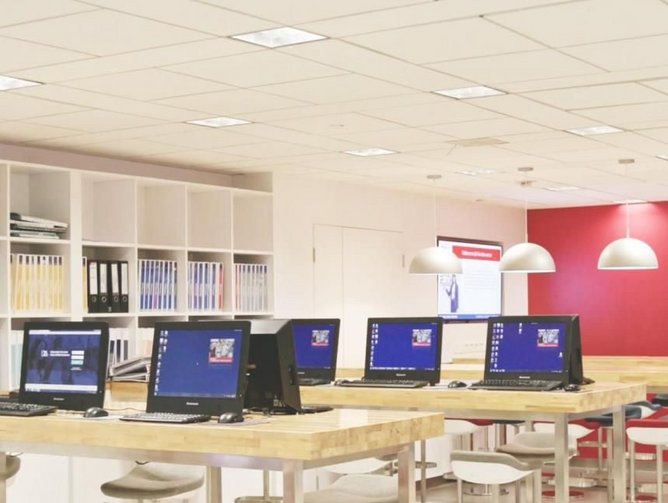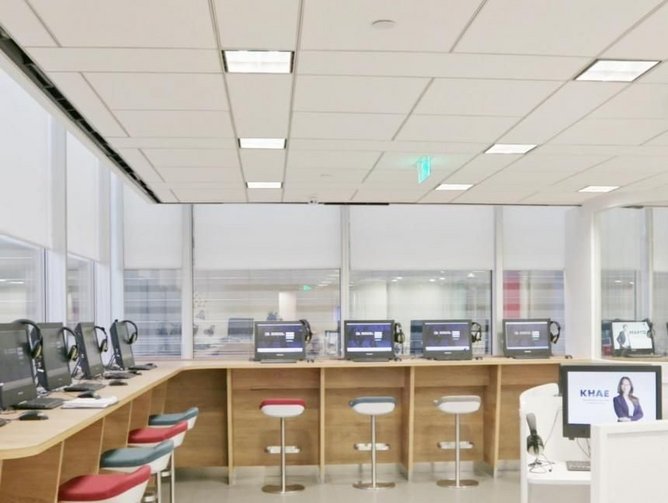How technology is helping Wall Street English deliver world-class English language tuition
English is the most widely used language worldwide, with approximately 1.5bn speakers around the globe.
The biggest market for learning a language is English, valued at over $50bn in annual revenues. Whether learning for travel, business or for socialising with friends and family, many people around the world have decided to learn English as an additional language.
This is where Wall Street English can support. With over 400 centres in 28 territories as well as a cutting-edge digital platform, the firm is one of the global leaders in adult English education.
“We’re focused on changing futures,” explains Michael Garcia, Chief Technology Officer. “As a premium offering, we emphasise the world-class service we offer and the support our students receive throughout their whole learning journey.”
With new grammar, rules, and accents, learning English can be challenging but Wall Street English believes it has perfected the right method of teaching through what is known as ‘blended learning’.
Combining online and digital media with traditional classroom methods, blended learning has become a tried-and-tested model in the education sector.
Garcia says that this modern take on learning is what distinguishes Wall Street English from its competitors today.
“We use digital, visual tools that help to introduce new concepts for our English learners. Then we reinforce those lessons with face-to-face encounters with a teacher,” he says.
“We never use technology for technology’s sake. For us, it’s about applying technology that is fit-for-purpose to maximise the learning experience. Our digital learning platform is a good example of this, which is why a few years ago we invested about $20mn to greatly enhance the learning experience. The feedback we received from our students has been really positive – they feel that the product is innovative, intuitive, and fun.
“Service and support are a huge differentiator for us,” he adds. “We don't just take on a new student and leave them alone. Complementary classes and teachers that you can connect with at our centres or through online communities make sure that students have the support they need to meet their objectives. We take pride in offering the most supportive training in the market. It's the way that we teach and the blended method, powered by technology, that really makes our programme work.”
With a global footprint spanning across Europe, Asia, Latin America, North Africa and the Middle East, Wall Street English has a rich legacy in the education market.
Now, following a promising purchase by Baring Private Equity Asia and CITIC Capital Holdings Limited, the firm is set to look for new markets in regions such as Japan, Germany and India whilst strengthening its position in its leading market – China.
“We have been present in China for about 18 years, and it is currently our largest market,” Garcia notes. “We've got 75 centres across 11 different cities there today and close to 70,000 students in the region with plans to grow further.
“Baring and CITIC purchased the company earlier this year and they each bring very unique and amazing strengths to the partnership,” he continues. “CITIC understands the Chinese market extraordinarily well and, as our largest market, it works to our advantage to gain deeper expertise in the region.
“CITIC have a strong relationship with technology giant Tencent, owners of the WeChat platform with over a billion registered users. That's beneficial for us as we can tap into their expertise to help accelerate our technology capabilities and reach more students.
“Baring is also very strong in the education space with several education companies within their portfolio, so we can learn a lot from them.”
As Chief Technology Officer, Garcia is all too aware of how technology is set to transform the education sector for the better.
At Wall Street English, he says that new cutting-edge tools are helping elevate the learning experience for students and franchise owners alike.
“We’ve evolved from our roots as a traditional bricks-and-mortar company,” he says. “Technology is helping to present more choice to our learners. Previously, we required students to come into our centres to register but last year we launched a new functionality in China through Alibaba’s Tmall platform, which allows students to enrol in some courses online whilst also allowing us to reach more prospective students.
“Earlier this year, we also re-launched our own branded website in China that allows students to register and pay for their course online. It's about the convenience factor. If they can't come into a centre because they're too busy or it's not in their direct location they can sign up, register and start learning online.”
Digitisation is not just transforming how consumers register for the course, it’s also giving them more flexibility and choice about where, when and how they’d like to study.
“Our platform is available on a globally distributed architecture that can be accessible 24 hours a day, seven days a week,” notes Garcia.
“We've launched mobile capabilities for our course so our students can learn on a smartphone or tablet. We also recently launched a digital classroom capability so that face-to-face interactions with teachers can happen online. We are constantly innovating and utilising the scaled agile framework to rapidly react to market needs.”
With a supportive learning environment and flexible study schedule, it seems that this model has been a roaring success.
The company owns its operations in China as well as partially in its native home of Italy but, beyond that, many of its centres across the world are franchised.
With a proven business model, a top-class product, and promising returns, the Wall Street English brand is an exciting investment opportunity that has attracted partners around the globe.
Garcia believes that digitisation is also helping the firm support franchisees and business partners so that they can become more profitable.
“As we complete the shift to new ownership, we are also promoting a very simple yet contemporary technology footprint,” says Garcia. “It’s an opportunity to really focus on what’s needed to operate the business and to minimise both the costs and the complexity of our technology environment for our franchisees.”
Other initiatives implemented by Garcia and his team include rolling out a new placement test that assesses students’ English ability.
Wall Street English is helping to provide more personalisation for learners and an adaptive, flexible learning environment and it seems data and analytics will be critical to make this a reality.
“We're always thinking about how we help our students achieve their personal goals through the power of learning English. Our course is structured into 20 levels. This means that, no matter where you are in your learning journey – if you're a beginner or more advanced – we can tailor the course to suit you.
“We're rolling out a new placement test that basically assesses our students’ English ability and tells them the level that they should be starting at when they join our course,” Garcia explains.
“Our students want a course that is tailored to their needs and can be adjusted depending on their progress. Some students may want to move more quickly, while others want to take their time and put a bit more emphasis on certain topics. We're using data to adapt the course to their needs.
“Today, we have a patented algorithm which considers several factors to understand how a student is progressing through their learning journey,” continues Garcia.
“It looks at several metrics and sends a warning if it identifies that a student is struggling or going off track. This allows our staff members to step in and intervene. We want to ensure that our students have a great experience and progress.”
Adapting to the ever-changing needs of the market is perhaps one of the biggest hurdles facing Wall Street English today, but by partnering with agile technology partners Garcia says the firm is ready for consumers’ education needs of tomorrow.
“We value the partners that really take the time to understand the dynamics of our business and want to evolve with us,” he adds.
“It is with such a changing landscape that we sometimes have to shift our focus very quickly to work on new projects. One of our partners, Slipstream, have been working with us for several years. They have shown a strong knowledge of the market and they understand our key enterprise platforms very well.
“It’s also great to have such a partnership with Baring and CITIC and access to their portfolio companies. For example, we work closely with CITIC Telecom to provide networking services in China.”
Today, Wall Street English stands as one of the largest providers of English language education for adults. The firm provides English language instruction to over 200,000 students worldwide, and thanks to its cutting-edge digital strategy it seems the firm is set to continue on this upward trajectory.
“Above all, what excites me in the next five to 10 years is the overall technology strategy,” Garcia says. “Technology has become a central aspect of the company's operations and its future growth so I’m excited to be playing such a big part in that while also having a direct impact in changing the lives of our learners.”
The efforts of the company’s technology department haven't gone unnoticed. CEO, David Kedwards, highlights that technology will remain a pivotal arm of the company’s business strategy.
"The investments we've made and continue to make in improving our technology capabilities are having a huge impact in the performance of our business, and most importantly, the outcomes of our learners,” he says. “Michael and his team are playing a central role in this digital transformation of our business."









